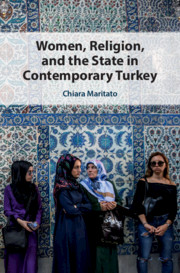Book contents
- Women, Religion, and the State in Contemporary Turkey
- Women, Religion, and the State in Contemporary Turkey
- Copyright page
- Contents
- Figures
- Tables
- Preface and Acknowledgments
- Abbreviations
- 1 Introduction
- Part I Transitivities
- Part II Women in the Diyanet
- 4 The Diyanet’s Policies toward Women
- 5 Vaizeler’s Invitation
- 6 Achieving Public Piety through the Vaizeler’s Sessions
- 7 Religious Counseling and Moral Support for Women and Families
- Part III Reassessing Women, Religion, and the State
- Bibliography
- Index
5 - Vaizeler’s Invitation
The Mosque as a Place for Women
from Part II - Women in the Diyanet
Published online by Cambridge University Press: 22 May 2020
- Women, Religion, and the State in Contemporary Turkey
- Women, Religion, and the State in Contemporary Turkey
- Copyright page
- Contents
- Figures
- Tables
- Preface and Acknowledgments
- Abbreviations
- 1 Introduction
- Part I Transitivities
- Part II Women in the Diyanet
- 4 The Diyanet’s Policies toward Women
- 5 Vaizeler’s Invitation
- 6 Achieving Public Piety through the Vaizeler’s Sessions
- 7 Religious Counseling and Moral Support for Women and Families
- Part III Reassessing Women, Religion, and the State
- Bibliography
- Index
Summary
The chapter presents the vaizeler’s engagement in inviting women to participate in the mosque’s public realm. This invitation (davet in Turkish) consists of a call of the vaizeler that dates back to the origins of Islam, a period reported as a “golden age” for women’s participation within the religious community. The Diyanet’s projects sought to invite women to mosques and to forge a “new religious woman” who is representing these old, traditional models in a modern way. In everyday life, inviting women to mosques requires the vaize to be aware of the communities’ heterogeneous attendance. Their sessions are places in which women share concerns with both the group and the preachers. Far from any wishful thinking about women’s resistance, victimization, or fears of “false consciousness,” the engagement of women in the Diyanet’s sessions embodies the concept of a “good Muslim woman” behaving piously in everyday life.
- Type
- Chapter
- Information
- Women, Religion, and the State in Contemporary Turkey , pp. 146 - 177Publisher: Cambridge University PressPrint publication year: 2020

